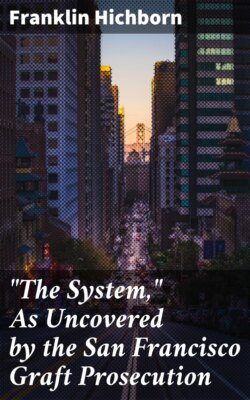Читать книгу "The System," As Uncovered by the San Francisco Graft Prosecution - Franklin Hichborn - Страница 12
На сайте Литреса книга снята с продажи.
CHAPTER VIII.
Ruef Loses the District Attorney’s Office.
ОглавлениеTable of Contents
While the impaneling of the Grand Jury was going on before Judge Graham, Ruef was disputing Langdon’s title to the office of District Attorney before Judge Seawell. In these proceedings Samuel M. Shortridge appeared with Ruef’s attorney, Ach, and Deputy City Attorney Baggett, not as amicus curiæ, but as Ach’s associate in the legal contest to force Langdon out of office.
The principal feature of Ruef’s case was the introduction of affidavits, signed by sixteen members[113] of the Board of Supervisors, in which the Supervisors denied committing felony of any character. Later, after the Supervisors had confessed, these affidavits were to be used by the defense at practically all the graft trials in efforts to break down their testimony against the bribe-givers.
During the examination, Ach endeavored to force from Langdon and his deputies a statement of what evidence they had against Ruef. In this Ach failed. On the other hand, the prosecution sought to bring out testimony that Ruef had directed Gallagher to suspend Langdon.[114] To this end Heney placed Ruef on the stand. But Judge Seawell stated[115] that he did not at that time wish to go into question of motive and the point was not pressed.
The outcome of the proceedings was a second victory for the prosecution. The injunction against Ruef was granted;[116] Langdon was left in peaceful possession of the District Attorney’s office.[117] Later, Judge Seawell issued a permanent writ of prohibition against the Board of Supervisors restraining that body from removing Langdon from office.
Langdon and his deputies, after a three-weeks fight, were free to proceed with the graft investigation.
